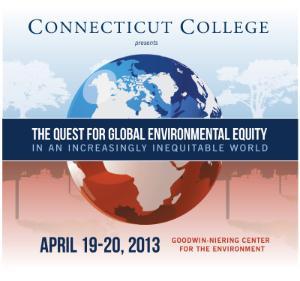 April 18, 19, 20, 2013
April 18, 19, 20, 2013
The 2013 Elizabeth Babbott Conant & Christian A. Johnson Endeavor Foundation Conference
Global Environmental Justice is not just an aspirational goal, rather it is a set of concrete objectives and principles that scholars, activists, concerned citizens and governments are striving to draw world attention to and promote through their actions.
Activists are exposing the injustice of the export of hazardous materials, such as the stream of highly toxic electronic waste (e-waste) that has been moving from North to South, creating contaminated electronic ghettos across India, China and northern Africa.
Corporate mining practices which leave local populations with poisoned water and toxic sludge are becoming front-page news. Impacts on indigenous and urban marginal populations have been especially severe with indigenous people displaced and growing urban slums exposing ever more people to horrific environmental conditions.
And the loss of biodiversity, such as African mega-fauna, is now being viewed in the context of the needs of struggling local populations and the search for ways to preserve biodiversity while meeting the environmental and material needs of local populations.
As awareness of the scale and scope of global environmental injustices has grown, many questions surrounding its causes, consequences, and viable solutions have emerged and are now garnering well-deserved attention.
The 2013 conference highlighted key aspects of environmental injustice through an in-depth examination of:
- globalization’s impact on India
- mining and environmental injustices affecting indigenous and urban marginal populations in Peru
- investigation into the challenges of supporting livelihoods and economic development while simultaneously preserving biodiversity in South Africa
The conference featured broadly interdisciplinary perspectives provided by activists and conservationists, human rights lawyers, philosophers, geographers, and political scientists.
In addition, 18 Connecticut College faculty from across the disciplinary spectrum participated in a two-year immersion study of these issues, and provided panel discussions that delved deeply into their on-site research excursions in India, Peru and South Africa.
View videos and read abstracts of the conference presentations
Visit our Facebook page for a photo album of our 2013 conference